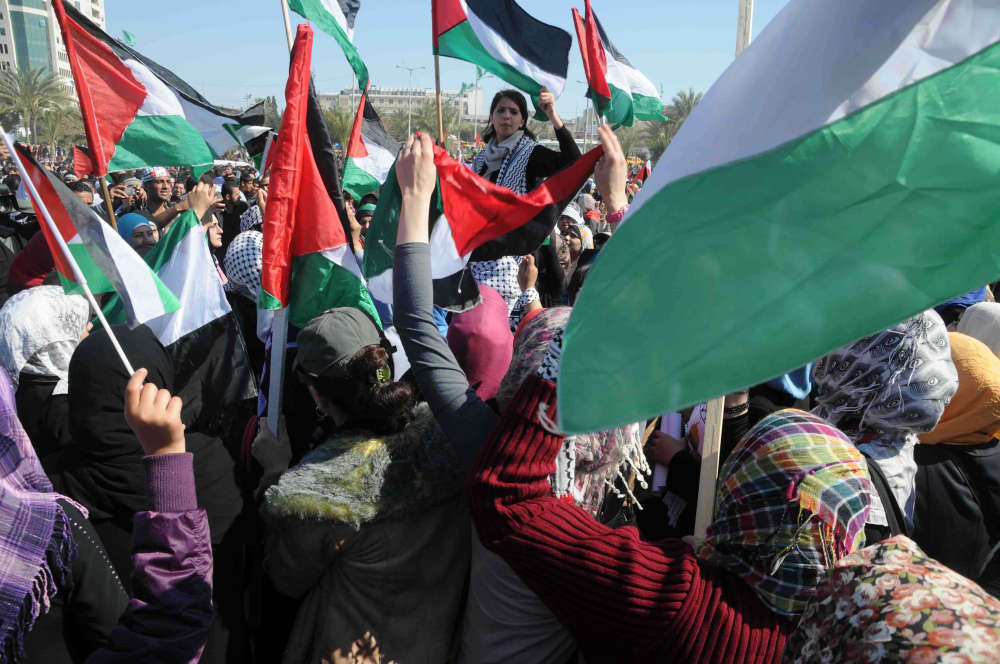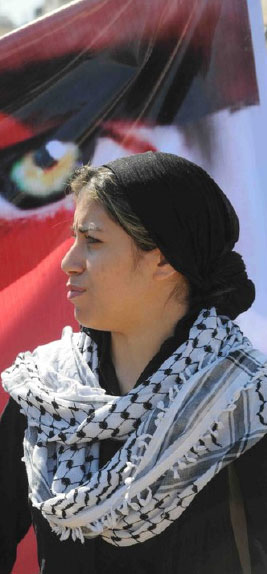By Willemijn van Lelyveld and Wafaa Al Kafarna
The adoption of landmark Resolution 1325 by the UN Security Council in 2000 represented a decisive moment and celebrated years of advocacy by women’s advocates globally. It recognized, for the first time in history, the role of gender equality and women’s leadership in international peace and security. Since then, the Women, Peace and Security Agenda has gained further prominence. Additional Security Council resolutions have been adopted that further elaborate on the importance of promoting gender equality and assuring women’s protection and participation, as well as their rights in mediation, peacebuilding, transitional justice, and reconstruction processes.i After all, as women represent half of the world’s population, it should be self-evident that their priorities and voices are included and heard when decisions are made on how to deal with a history of atrocities and reconstruct society after years of conflict or crisis.
Unfortunately, reality on the ground paints a bleaker picture. Women continue to be excluded from formal discussions on transitional processes, and are denied the right to participate in decisions that will shape their future lives and those of their families and communities. The percentage of women in peace talks globally has continued to be low,ii with national dialogues and decisions in conflict-affected countries frequently dominated by a small group of male politicians.iii And this even though a growing body of evidence suggests that the involvement of women in peace, security, and transition processes makes it more likely that justice, reconciliation, and accountability are addressed – which therefore makes peace deals more sustainable.iv
The Palestinian context is no different. Women in Gaza have been largely excluded from formal dialogue efforts to end the Palestinian political division. Their voices and concerns have neither been heard nor included in the various reconciliation talks held and agreements reached since 2005. A simple analysis of the number of men and women representatives – which does not necessarily equate meaningful representation – shows that only a few women participated in official meetings held between the political parties in Cairo in 2011. Not a single woman participated in the talks leading up to the signature of the reconciliation agreement between Fatah and Hamas’ political leadership in October 2017. As a result, no women are represented in the technical committees that were established afterwards in order to flesh out the details of the reconciliation arrangements that will directly impact their lives and society.
Reasons for the absence of women in these processes are multiple. A combination of political, geographical, and social factors impedes the ability of Palestinian women to engage in political activism. Harmful gender stereotypesv that prescribe the role of women in society are a central feature in the State of Palestine, thus limiting women’s equal access to resources, decision-making power, and knowledge. In addition, the ongoing occupation significantly impacts women’s effective participation in transitional justice and peace processes. Access challenges due to the blockade of the Gaza Strip have hampered the ability of women activists from Gaza to develop a unified voice with their colleagues from the West Bank. Since June 2007, women activists in the Gaza Strip and the West Bank have resorted to various, often expensive, means to maintain contact and organize themselves, such as through video-conferencing or via meetings held out of the country – if they are granted exit permits by Israel. Such logistical challenges have debilitated activists’ ability to meaningfully participate and represent Palestinian women at the national level. Indeed, a 2015 study stated that 72.9 percent of interviewees agreed that checkpoints and the separation policies practiced by the occupation have (significantly) decreased interaction among the feminist movement in the State of Palestine.vi
This is by no means due to a lack of capacity: within the extremely limited space they have been granted by the occupation and Palestinian political patriarchy, Palestinian women are well organized and have received recognition as peace activists in international fora, speaking strongly and courageously on their political insights and vision.vii At home, women have been actively engaged in various informal efforts to end the division and advance Palestinian unity. They have claimed their space through initiatives away from the spotlights of the press, by organizing roundtable discussions, presenting research papers, and developing joint positions to advance what was is missing in formal agreements signed by politicians, thus reflecting their priorities. A good example of a women’s initiative in Gaza was the joint peaceful strike that was organized for two years (2012 –2014) on a weekly basis by the General Union of Palestinian Women in Gaza, women’s centers, and political representatives with the aim to end the divide. The gatherings – which also saw the participation of men – were held in front of the building of the Palestinian Legislative Council (PLC). The organization of these strikes was far from easy, given that the de-facto authorities in Gaza were opposed to public gatherings. Some women were detained due to their participation in these activities. Activities were concluded when in September 2014 Hamas and Fatah leaders signed a reconciliation agreement in Cairo.
Recently, the member of the Fatah Central Committee who is in charge of the reconciliation file reaffirmed his full support for women’s participation in the reconciliation process, promising to include women in all of the reconciliation committees.viii This is an important and positive development towards ensuring that women are part of the formal decision-making processes. However, no further concrete actions have been taken as of yet to make good on this promise.

The Sawasya Programme represents the joint work of three members of the UN family – UN Women, UNICEF and UNDP – in support of strengthening the rule of law in the State of Palestine. Making sure that women and children can fully access their rights and are protected under the law are central features of our programme. We work with our partners in different ways to accomplish this, making sure that justice and security services respond to the specific needs of women and children, any barriers to access these services are lifted, children and women are fully aware of and claim their rights, and policy and legislative frameworks are in line with international human rights standards. Key part of this objective is to support efforts that work towards a unified justice sector and a legal framework in order to provide equal justice to men, women, and children across the Palestinian state. In this context, questions related to transitional justice will need to be answered: What does reconciliation mean in the Palestinian context for those that have been most affected? How do we deal with the past period of division and its consequences for the population of Gaza? And how do we move on from here, what reforms must be implemented to ensure that this does not happen again?
The signature of the reconciliation agreement between Fatah and Hamas provides a critical window of opportunity. It allows for the integration of a gender perspective and for women to have a say in what reconciliation means to them, making them part of both the design and the implementation of transitional-justice measures. Such involvement is crucial, because it is impossible to develop protection and accountability measures that respond to women’s concerns and priorities without their full participation at all levels. Indeed, from recent discussions held with women’s organizations in Gaza, it has become apparent that advocacy efforts by women’s organizations have thus far centered around two key demands: an end to the political division and a space to participate in the political decision-making processes. Therefore, they call upon the Palestinian government to put in place measures to guarantee the representation of women and their priorities in the various committees created under the Cairo Agreement. This should be matched by giving increased support to efforts that aim at increasing women’s participation in decision-making bodies, and by implementing legislative reform that advances women’s participation in the political process. In addition, harmful gender stereotypes that impede political participation must be continuously challenged through legal and economic empowerment efforts, advocacy, and the raising of awareness. And finally, support must be given to national representative bodies, networks, and platforms that ensure systematic dialogue between civil society representatives in the West Bank and the Gaza Strip. Including young women in this process is crucial, and can be accomplished by working with schools and universities in order to build a new generation of political leadership.
To overcome a legacy of division and political unrest, reconciliation will need to be an inclusive process that restores social cohesion. If seized, this presents a critical opportunity to break with past practices and open up new spaces and possibilities for women’s political participation. It requires determined efforts by all segments of society, the government, civil society, and the international community, so we can build a sustainable and peaceful future.
Ms. Willemijn van Lelyveld, a Dutch National, is Programme Management Specialist at UNDP/PAPP. Currently working with the UNDP/UN Women/UNICEF Sawasya Programme, she is in charge of managing its portfolio’s components related to human rights, legal aid, gender, and juvenile justice. Ms. van Lelyveld has extensive experience working on gender-responsive peacebuilding and rule of law in different country settings, including in Palestine, the Democratic Republic of the Congo, and at the UN Headquarters in New York.
Ms. Wafaa Al Kafarna resides in Gaza, where she is a project management analyst at UNDP/PAPP. Currently working with the UNDP/UN Women/UNICEF Sawasya Programme, she is responsible for the management, implementation, and delivery of the key components of the program portfolio in Gaza that are related to the civil-society contributions to the rule of law and to community access to justice. Ms. Kafarna has extensive experience in working on the protection of women’s rights and the promotion of gender equality in Gaza.
i UNSCR 1820 (2008) and UNSCR 1888 (2009) on conflict-related sexual violence, UNSCR 1889 (2009) on obstacles to women’s political participation, UNSCR 1960 (2010) on sexual violence in conflict, and UNSCR 2016 and 2122 (2013) on implementation of previous resolutions.
ii Preventing Conflict, Transforming Justice, Securing the Peace: A global study on the implementation of United Nations Security Council Resolution 1325, UN Women, 2015, available at http://www.peacewomen.org/sites/default/files/UNW-GLOBAL-STUDY-1325-2015%20(1).pdf.
iii Women’s Participation in Peace Negotiations: Connections Between Presence and Influence, UN Women, 2012, available at http://www.unwomen.org/-/media/headquarters/attachments/sections/library/publications/2012/10/wpssourcebook-03a-womenpeacenegotiations-en.pdf?la=en&vs=1159.
iv Reimagining Peacemaking: Women’s Role in Peace Processes, International Peace Institute, 2015, available at http://www.inclusivepeace.org/sites/default/files/IPI-Reimagining-Peacemaking.pdf.
v Gender stereotyping refers to the practice of ascribing to an individual woman or man specific attributes, characteristics, or roles by reason only of her or his membership in the social group of women or men. Gender stereotyping is wrongful when it results in a violation or violations of human rights and fundamental freedoms. An example of this, is the failure to criminalize marital rape based on the societal perception of women as the sexual property of men. (See also the official definition issued by the UN at http://www.ohchr.org/EN/Issues/Women/WRGS/Pages/GenderStereotypes.aspx).
vi The Status of Political Participation among Palestinian Women Under UNSCR 1325 (in Arabic), Women’s Affairs Technical Committee, 2015. The research sample consisted of 3,255 persons from the West Bank, including Jerusalem, and the Gaza Strip, aged between 17 and 76 years old.
vii Vanessa Farr, “UNSCR 1325 and Women’s Peace Activism in the Occupied Palestinian Territories,” International Feminist Journal of Politics, 2011, available via http://www.tandfonline.com/doi/abs/10.1080/14616742.2011.611661.
viii See “Annual Report 2016,” The Palestinian Initiative for the Promotion of Global Dialogue and Democracy (MIFTAH), October 7, 2017, available at http://www.miftah.org/Mact/MiftahActivityReport2016En.pdf.


